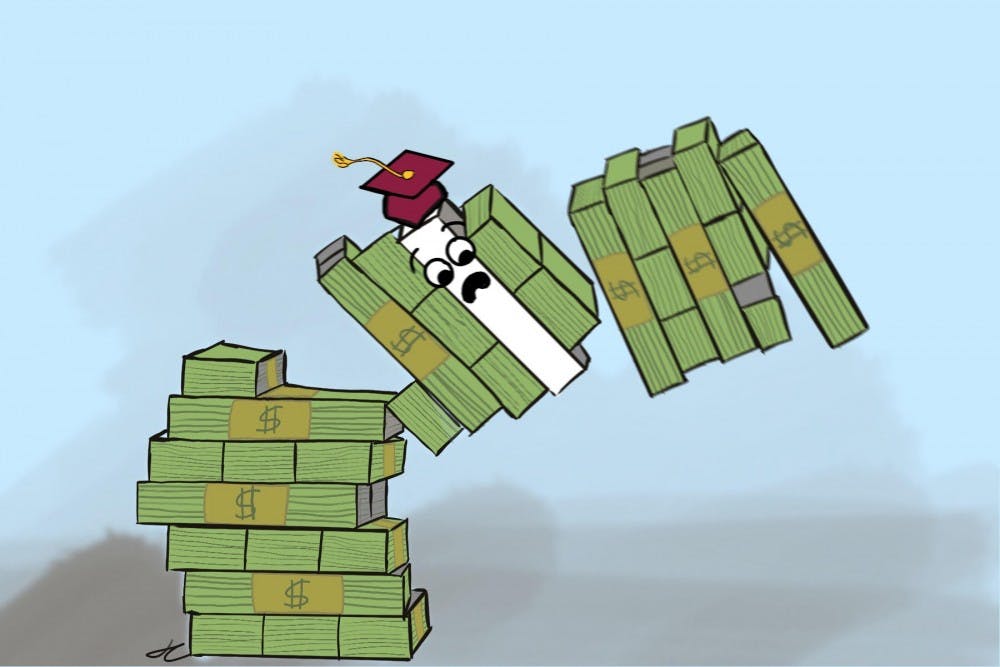In collegiate culture, the connection between fascism, academia and capitalism is not often seen. However, these things have a strong and significant relationship which impact the lives of students.
Fascism is when a one-party dictatorial power takes complete control and power over an entire population of people. They suppress criticism and opposition by dominating an aggressive nationalistic agenda.
It occurs as capitalism decays. Ultimately, class warfare reaches a peak and a fascist regime gains control of the entire political and social system.
"Fascism happens when the market is not suppressed, but democratic political institutions are in the name of a militant national unity," Mark Von Hagen, professor at the School of Politics and Global Studies, said.
This is more relevant to college students' lives than one may think.
When school becomes too expensive, it gives way for economic depression and market manipulation. The economic depression becomes too overwhelming despite innovations, and the reach of capitalism continues to spread.
Unfortunately, the elitist upper class continues to be perceived as the heroes who rally for a unified patriotic front to eliminate the groups who pose a threat to their power.
In theory, capitalism can be a good thing where a free market enterprise exists and any individual can make a profit.
But only in moderation, not when corporations and profits are put above the welfare of people. A decay in capitalism leads the way to fascism by turning the working class against itself.
This working class struggle is evident in the economic atmosphere of universities.
The ivory tower of academia known as higher education welcomed the beginnings of fascism. This is evident in the continued socioeconomic disparities in young adults who are not able to succeed in this system.
Although there is continued support from scholarships and grants to help less privileged students succeed, success in the university is only allowed to the most intellectual of the underprivileged students.
It is much more common for students battling these social and economic barriers to be bright B and C students, than exceptional A students.
These rare exceptional A students often have a parent who attended a university, or became tokenized while attending a upperclass high school and were assimilated into a privileged culture.
These poster children become the generalization of their race. These anomalies become unrealistic examples of the minority experience.
Students of color continue to get lost in the education system, while economically privileged students who are bright, but not exceptionally smart, are more likely to succeed. This discrimination is subtle — but it is there.
Arizona has some of the worst government cutbacks for higher education. Trump's budget plan for low-income college students is disheartening. Pell grants will be reduced by $3.9 billion dollars and funding will be slashed for the Federal Supplemental Educational Opportunity Grant (FSEOG).
Public universities continue to mimic the private sector by acting as for-profit corporations that support the narrative of capitalism. When employees of the university are overpaid while those with less privilege continue to struggle to pay tuition — it closely resembles fascism.
The university system often fails to teach students to be free thinkers. Instead they are taught basic, and formulaic thinking skills. This contributes to oppression — as it discourages students from finding issue with the system they are a part of.
Capitalism does have its benefits in moderation. It is the reason why ASU remains #1 in innovation, and why the technological developments have helped the university prosper. Capitalism can work as long as free thought is encouraged.
Reach the reporter at rdomin10@asu.edu and follow @becca_stories on Twitter.
Like The State Press on Facebook and follow @statepress on Twitter.
Editor’s note: The opinions presented in this column are the author’s and do not imply any endorsement from The State Press or its editors.
Want to join the conversation? Send an email to opiniondesk.statepress@gmail.com. Keep letters under 500 words and be sure to include your university affiliation. Anonymity will not be granted.




